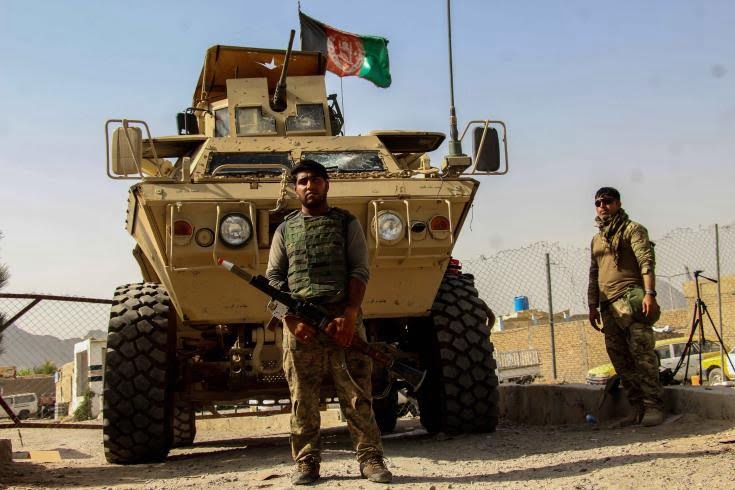INTERNATIONAL RELATIONS
INTERNATIONAL RELATIONS

The Afghan army is reshaping its war strategy against the Taliban. Its forces will be concentrated in areas considered to be of the greatest strategic importance, such as the capital Kabul, major cities, border crossings and major infrastructure, Afghan and US officials explain.
This politically dangerous strategy inevitably means that part of the territory will be left to the Taliban. However, officials insist that this is an operational necessity, as the armed forces have gone too far in their efforts to prevent the loss of provincial capitals, something they anticipate will worsen the situation in the country.
The reorganization of forces, which has already been publicly acknowledged, comes as the US military continues to withdraw from the country, something which is expected to be completed on August 31, following orders from US President Joe Biden.
Islamist insurgents are increasingly occupying more territory, the US Pentagon estimated last Wednesday, that they now occupy more than half of the centers of Afghanistan’s regions. The Taliban are also putting pressure on half of the provincial capitals, trying to cut them off from the rest of the country.
Also read: VIDEO | Afghanistan’s Fight Against Taliban – Air Force operations footage
US intelligence officials have warned that the Afghan government could be ousted in as little as six months, US officials told Reuters. An anonymous Afghan official said the “redeployment” of troops would allow Kabul to retain control of areas and infrastructure of strategic importance, such as an Indian-built dam and major roads. However, the redeployment and concentration of forces also means that areas will remain unaffected, which will upset communities and tribes who feel that their government is merely leaving them to the hands of the Taliban.
US Secretary of Defence Mark Milley, the chief of the US Department of Defence, acknowledged that the new strategy meant abandoning “regional centers” to protect more populous cities, such as the capital, Kabul. He said the Taliban seemed to have the advantage, that they had gained “strategic momentum”. “There is a possibility of a complete occupation (of the country) by the Taliban,” among other “scenarios,” General Milley told a press conference Wednesday, but did not consider the outcome “yet.”
The rise of the Taliban has alarmed many Afghans as the United States withdraws from the war in which it became involved after the 9/11 attacks on New York and the Pentagon attributed to al-Qaeda. This war did not bring, as Washington said, the pursuit of peace in Afghanistan. The Biden government has vowed to continue to provide financial support to the Afghan armed forces and to double its efforts to advance the stalled peace talks.
Nevertheless, the Taliban did not respond to calls from 15 foreign diplomatic missions and NATO on Monday to halt their large-scale offensive. The rebels and the government have not been able to agree on a ceasefire in talks between them in Doha, Qatar, ahead of the Feast of Sacrifice.
Also read: The Taliban now control more than half of Afghanistan regions
USΑ | Bipartisan Bill Submitted to US Congress to Lift Cyprus Arms Embargo
A bipartisan bill titled the “American-Hellenic-Israeli Eastern Mediterranean Counterterrorism and Maritime Security Partnership Act of 2025”…
Germany | 5,000-Man Armoured Brigade in Lithuania to Bolster NATO’s Eastern Flank
Germany officially commenced its first permanent deployment of foreign troops since World War II on Tuesday.
EIB | Measures to Finance European Security and Defence and Critical Raw Materials
The European Investment Bank (EIB) has agreed on a series of measures to further boost investment in security and defence, as well as in critical raw materials.
CERIDES | 1st Planning Conference of the UCPM DEMONAX – Cyprus Earthquake Full-Scale Exercise
CERIDES – Centre of Excellence in Risk and Decision Sciences of European University Cyprus had a strong presence during the 1st Planning…
EMAK | New Operational Boost with Eight INTRUDER SE Drones
The Ministry of Climate Crisis and Civil Protection is moving forward with the procurement of eight INTRUDER SE-type unmanned aerial…
KNDS France – METLEN | Partnership for the Production of the VBCI PHILOCTETES® in Greece
METLEN has entered into an exclusive partnership with KNDS France for the production of the latest-generation French 8×8 Infantry Fighting…
USΑ | Bipartisan Bill Submitted to US Congress to Lift Cyprus Arms Embargo
A bipartisan bill titled the “American-Hellenic-Israeli Eastern Mediterranean Counterterrorism and Maritime Security Partnership Act of 2025”…
AI Task Force | First Session of the National Committee for Artificial Intelligence of Cyprus
The first session of the National Commission for Artificial Intelligence (AI Task Force) was held, marking the official start of the work…
Germany | 5,000-Man Armoured Brigade in Lithuania to Bolster NATO’s Eastern Flank
Germany officially commenced its first permanent deployment of foreign troops since World War II on Tuesday.















